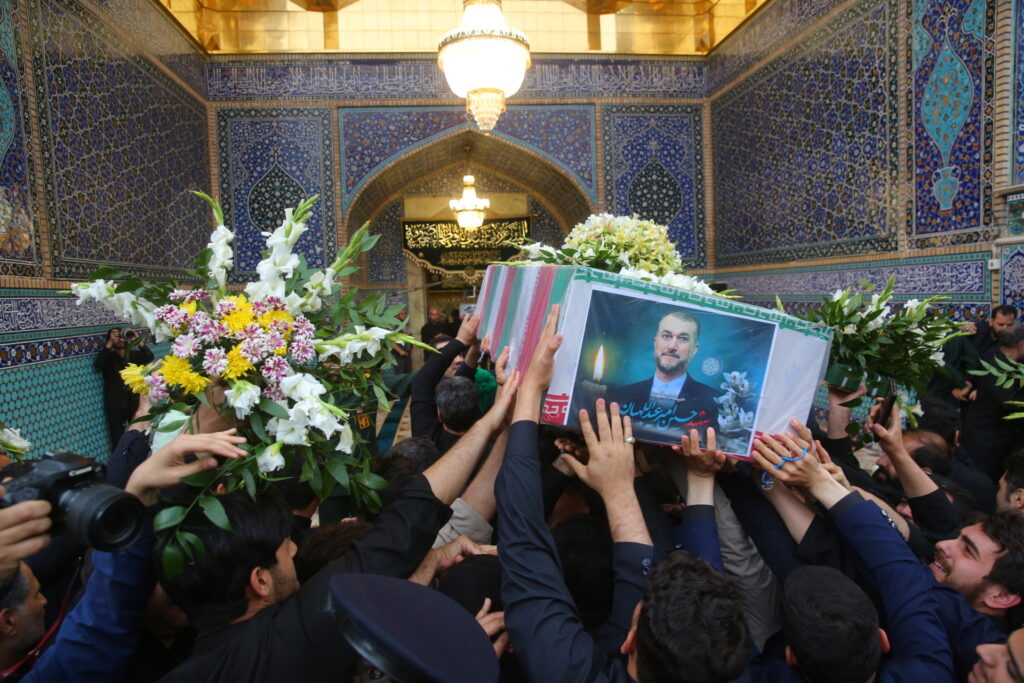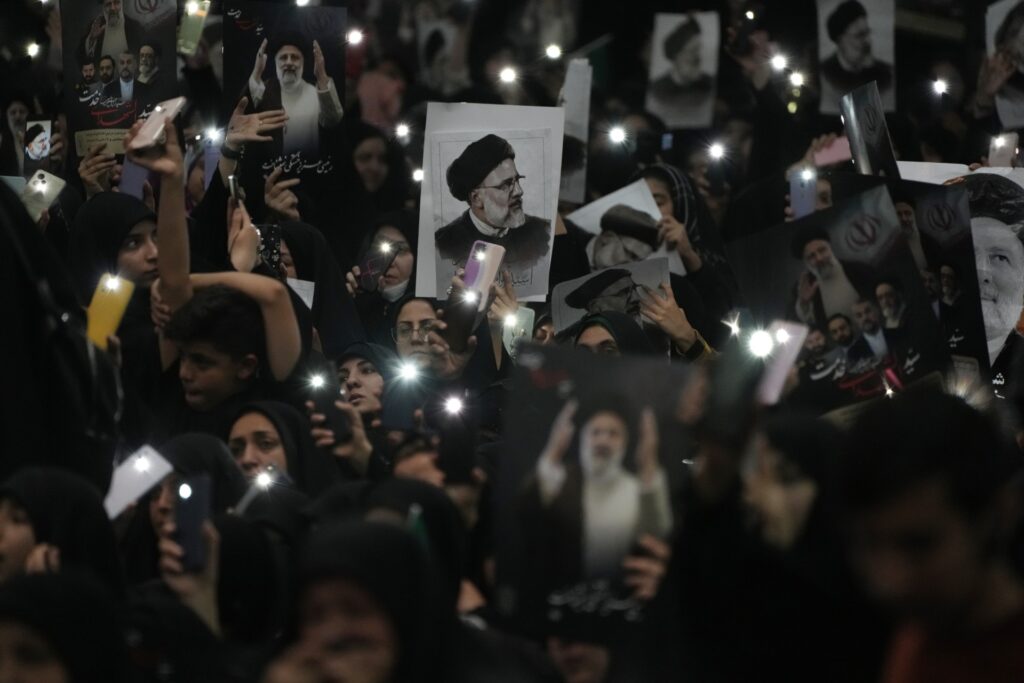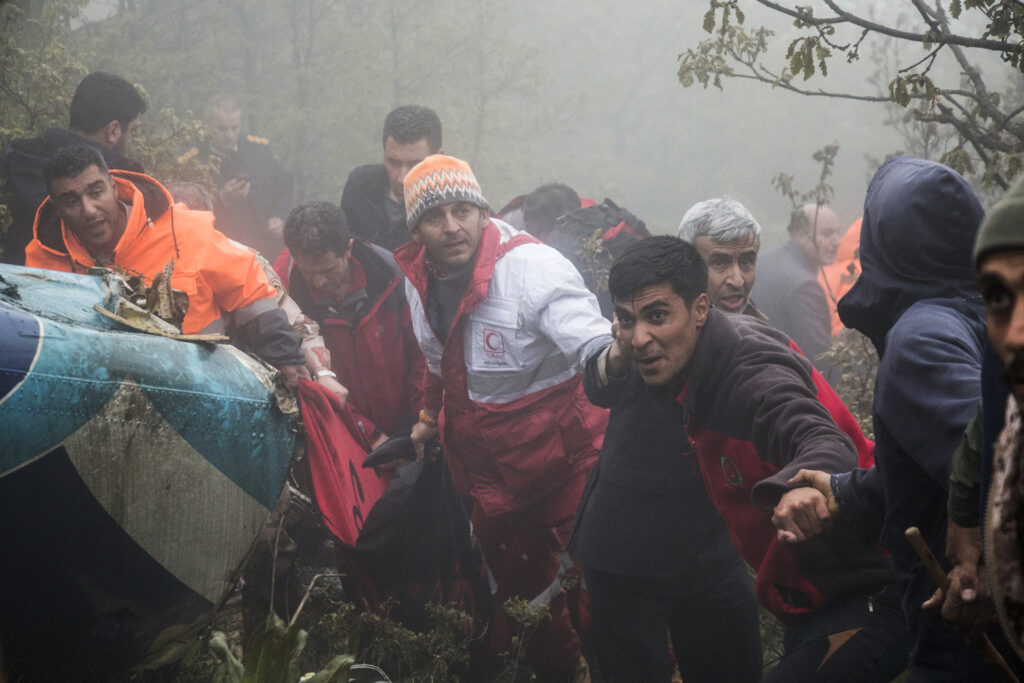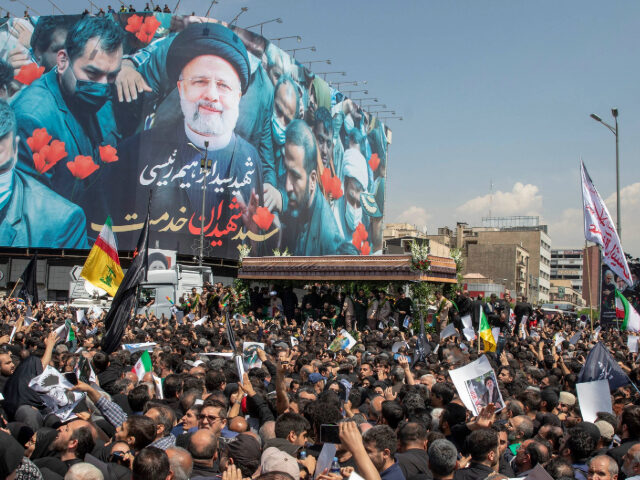Anti-regime activists in Iran reportedly said on Wednesday that they received calls from “desperate” officials urging them to attend public displays of mourning for President Ebrahim Raisi.
The regime is cracking down on expressions of joy and relief from dissidents after Raisi’s death in a helicopter crash on Sunday.
The regime quickly sensed it would have a problem with the public response to Raisi’s death, as disgruntled Iranians danced in the streets and launched fireworks to celebrate the news. Women persecuted under Raisi’s vicious crackdown on the Mahsa Amini uprising, and the families of women killed by Raisi’s thug squads, were especially quick to celebrate his demise.
Compounding this uncertainty was the regime’s own ambivalent feelings about the late president and how it wanted to use the helicopter crash for political purposes. Raisi was seen as a protege of Ayatollah Ali Khamenei and a front-runner to replace him, which also means he had enemies in the endless factional struggles for power in Tehran. He could also prove useful in death as a scapegoat for public discontent about the corruption and incompetence of the Iranian government.
The result was that Raisi’s funeral was a “muted” affair — the most common term used by foreign media covering Wednesday’s events — and only too late did Iran’s rulers realize that turnout for public ceremonies of mourning would be embarrassingly light if they did not make an effort to get people into the streets.

People carry coffins during a funeral procession in Qom on May 21, 2024, for late Iranian President Ebrahim Raisi, Foreign Minister Hossein Amir-Abdollahian, and six other passengers and crew who were killed in a helicopter crash on a fog-shrouded mountainside in the northwest. (Ahmad Zohrabi/picture alliance via Getty Images)
According to several activists who spoke to Sky News on Wednesday, officials made desperate phone calls to individual Iranians, urging them to attend events held in Raisi’s honor. Iranian officials were reportedly mortified to discover that many of their subjects were using the five-day national period of mourning declared on Sunday as an opportunity to go shopping or engage in leisure activities instead of demonstrating the desired level of anguish.
“We keep receiving messages and calls from different governmental institutions, inviting us to different mourning events. They’re really desperately trying to get people to go,” one of the activists said. “But I don’t think many people will show up, and anyone that does, is most certainly one of their own. For ordinary people, this is just another day.”
Another activist said security around Raisi’s funeral events was noticeably high, suggesting “the regime is clearly scared.”
“In a rather stupid manner, they are trying to engineer an atmosphere, as always, to pretend like things are going their way. But I don’t think this will pay off,” the activist said contemptuously.
“We’re talking about a murderer, that millions of Iranians have been wishing for years, that him and his gang get prosecuted and to face justice in a proper court. But this time, nature stepped in, as if even nature could no longer bear so much cruelty,” the second source mused.

Mourners hold up posters of late Iranian President Ebrahim Raisi at the Khomeini Grand Mosque in Tehran, Iran, on May 21, 2024, during a funeral ceremony for him and his companions who were killed in a helicopter crash on Sunday in a mountainous region of the country’s northwest. (AP Photo/Vahid Salemi)
The activists added that public interest in June’s rigged “election” to replace Raisi is also low, and many dissidents are planning to boycott the vote.
An Iran-based group of human rights lawyers called Dadban said on Tuesday that regime security agents are harassing citizens who expressed happiness at Raisi’s death online. Iran’s Internet censorship agency warned on Monday that “provocative” posts would not be tolerated.
Voice of America News (VOA) noted there is plenty of illegal happiness online to keep the cyber police busy:
The Islamic Republic’s Iranian critics inside and outside Iran have flooded social media with mockery of Raisi since his death, with some posting the Persian hashtag “helicotlet,” a combination of the words helicopter and cutlet. Many of those critics celebrated the 2020 killing of top Iranian commander Qassem Soleimani in a U.S. missile strike in Baghdad by referring to him as a “cutlet.”
Persian social media users also posted videos appearing to show people in different parts of Iran sharing sweets and chocolates on Monday to celebrate Raisi’s death.
According to Dadban, prison officials also took action against a group of political prisoners who exuberantly celebrated Raisi’s death, hustling them off to undisclosed locations to silence them.
A journalist named Manijeh Moazenzadeh said on Tuesday that the government was persecuting her for “my reaction to Raisi’s death and how I reported it.”
Moazenzadeh said she was detained for 19 days in 2022 for writing articles that displeased the regime. She did not specify what details of her article on Raisi’s death angered the Culture and Media Prosecutor’s Office; it is possible the prosecutor has not yet told her what she allegedly did wrong.
Beyond the reach of the regime’s secret police and censors, celebrations of Raisi’s death were observed outside Iranian diplomatic facilities in London, Copenhagen, Frankfurt, The Hague, Stockholm, and Toronto.

Rescuers recover bodies at the crash site of a helicopter transporting Iranian President Ebrahim Raisi, Foreign Minister Hossein Amir-Abdollahian, and others in a fog-covered mountainous area of Varzaghan in northwestern Iran on May 20, 2024. (AZIN HAGHIGHI/MOJ News Agency/AFP via Getty Images)
“My happiness has no limits. Today is a beautiful day for the people of Iran,” said Esmat Vatanparast, an elderly Iranian exile in Sweden whose family fled Iran during the mass executions of political prisoners and dissidents overseen by Raisi in the 1980s, earning him the nickname “Butcher of Tehran.”
“I’m happy at this moment because a symbol of murder is gone. I would be lying if I said the news of the death of this executioner did not bring me joy,” said Mehdi Aslani, another survivor of the Raisi executions who fled to Germany in 1988.
Many Iranian exiles said their only regret is that Raisi never stood trial for his crimes against humanity and took too many secrets to the grave with him.
Ali Safavi of the National Council of Resistance of Iran (NCRI) said on Tuesday that the celebrations underscore “the profound detestation and revulsion that the Iranian people felt toward Raisi — a man whose legacy is inextricably linked with the darkest chapters of Iran’s recent history.”

COMMENTS
Please let us know if you're having issues with commenting.